The biggest risk to our bullish forecast
|
Morgan Stanley has a decidedly bullish view on the trajectory of the global economy and, by extension, markets for 2021. We view 2021 as the start of a new economic cycle and there are already indications that we might be moving into the next stage of this cycle. However, a key part of our forecast is conditional on a "grand reopening". We expect countries to effectively administer the COVID-19 vaccine and in turn reduce social distancing measures. This is expected to lead to the unleashing of significant household savings, and will ultimately result in robust economic growth. Therefore, a key risk in our economic forecasts hinges on the successful deployment of the COVID-19 vaccine. Firstly, it looks increasingly likely that vaccines are effective in controlling Covid-19. Israel's early agreement with Pfizer gives us a preview of what a successful global vaccine rollout could look like. Currently, more than 62% of Israelis have already had one dose of the vaccine, and more than 57% are now fully vaccinated. Based on this real-world sample set, the Pfizer vaccine has been shown to be around 92% effective in preventing the COVID-19 infection. In addition, an Israeli study that attempted to decouple the impact of social distancing from the vaccine's effect concluded that the vaccine directly impacted the number of cases and hospitalisations. The study focused on those individuals over 60 years old where the highest level of completed vaccinations had occurred. It was observed that the number of COVID-19 cases in vaccinated people started to decline significantly compared to the cases among unvaccinated people. The vaccine also showed it reduced the incidence of hospitalisation (see Biotechnology: COVID-19 Vaccine: What Can We Learn From Israel? 10 February 2021). Israel’s experience confirms that after social distancing, vaccines are an effective method to control COVID-19. Matthew Harrison, who has led Morgan Stanley’s Biotechnology Research since the start of the pandemic, provided much of the published work which assisted this review.
While COVID-19 is a global problem, it is important to remember that a few countries/regions account for the vast majority of global economic activity. Accordingly, the economic performance of these key regions will have a disproportionate impact on our forecasts. Exhibit 1 shows the US, China and Europe account for more than half of our global economic forecast. India, Australia and New Zealand are also included below to highlight that while the COVID-19 situation in each country is nearly at opposite ends, their combined economic relevance is relatively low. Exhibit 1 – Share of Global GDP (%) 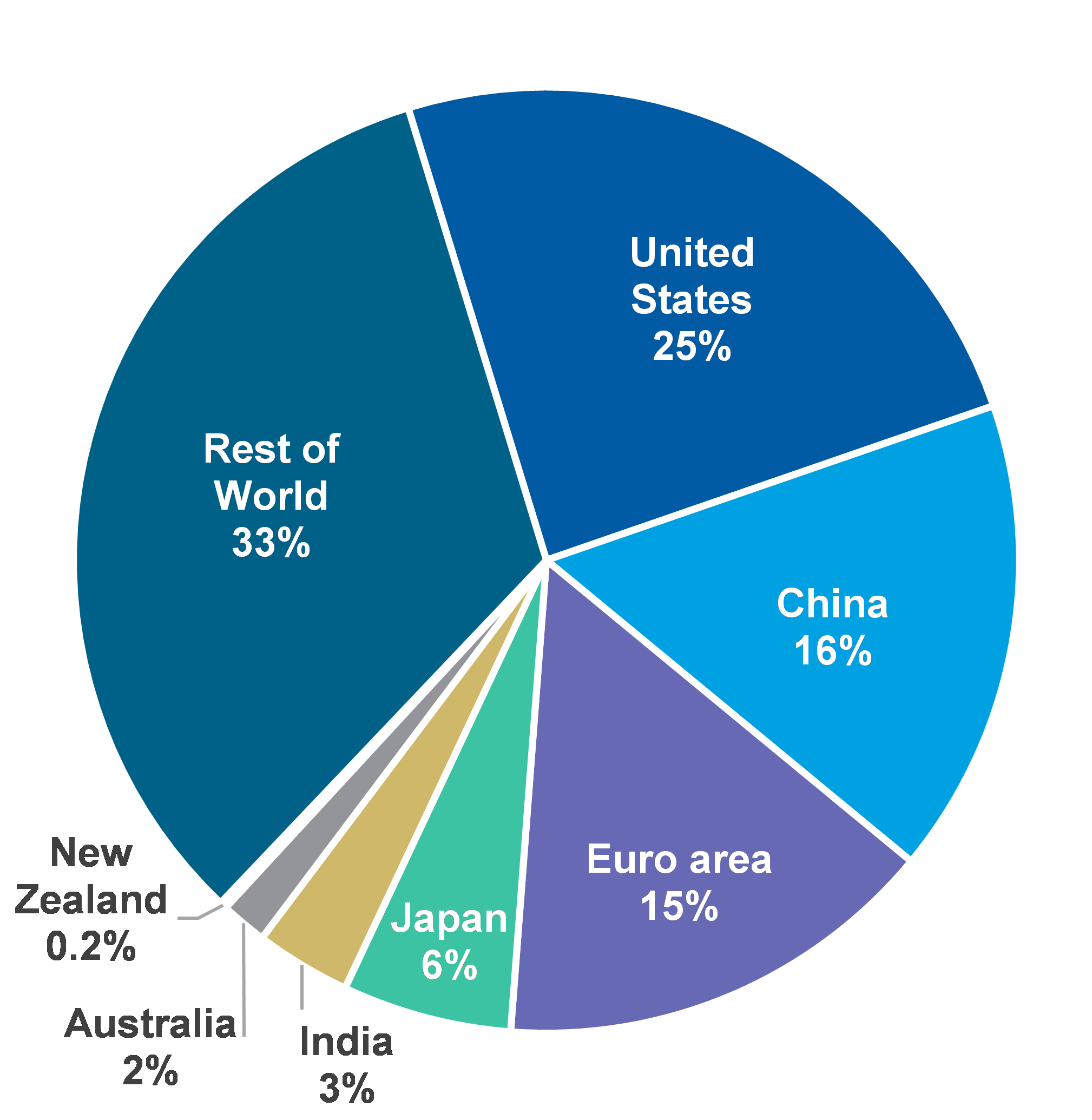
Source: World Bank, Morgan Stanley Wealth Management Research. As of December 2019. Exhibit 2 shows the US is well ahead of the other major economies on a per capita basis in terms of the country’s COVID-19 vaccine rollout. Based on this vaccination rate, Morgan Stanley believes the US could effectively control COVID-19 by early July when the country achieves "max vax", having vaccinated everyone over 12 years old. While this might suggest our “grand reopening’ forecast is at risk given where the other major economies are with their vaccination programs, economic indicators are still tracking to our bullish forecast. For example, the global manufacturing PMI recently reached a new 15-year high at 57.5, led by the strong performance in the major global economies (see Exhibit 3). Exhibit 2 – Daily Covid-19 vaccine doses administered per 100 people 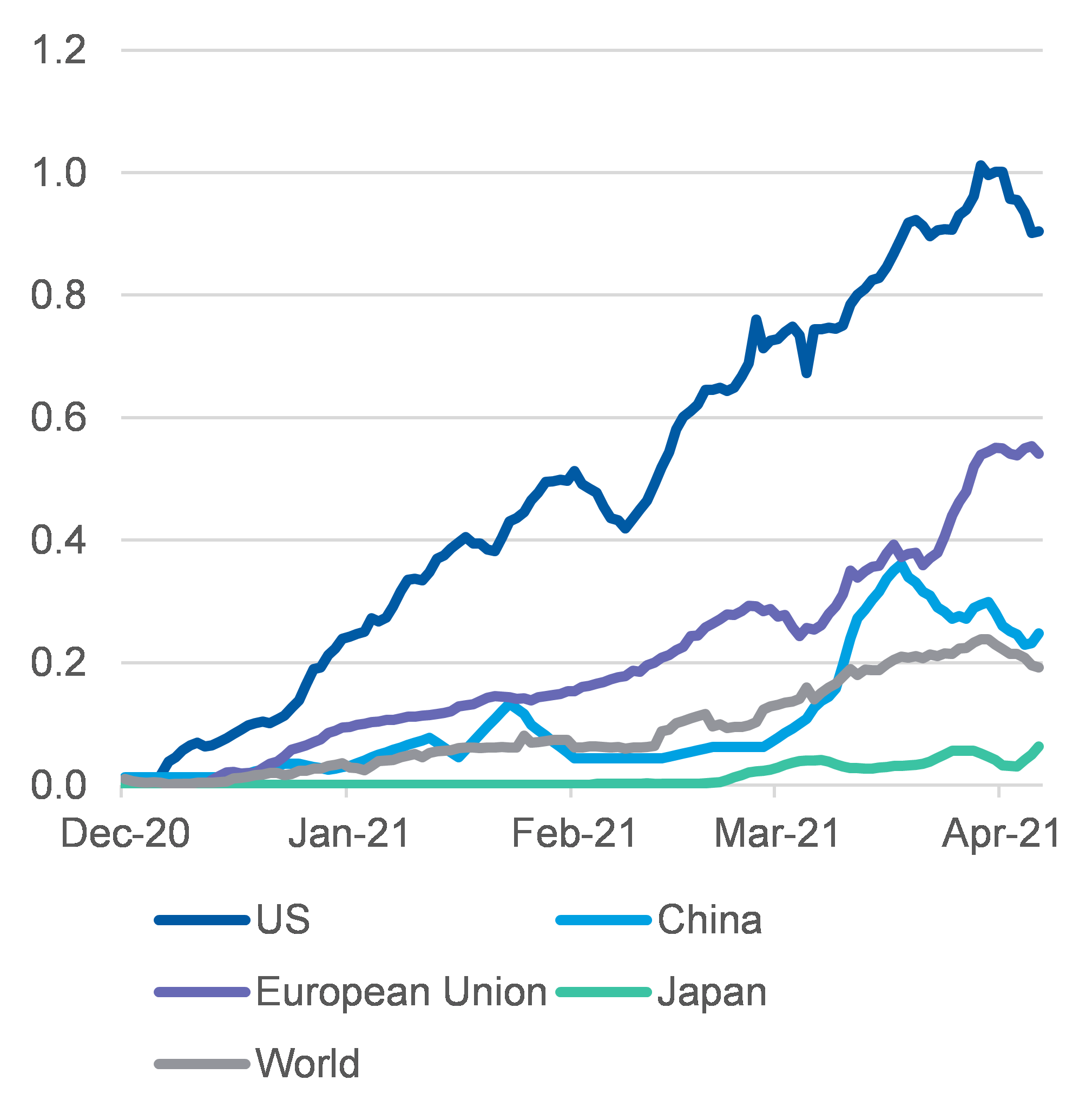
Exhibit 3 – Manufacturing PMI 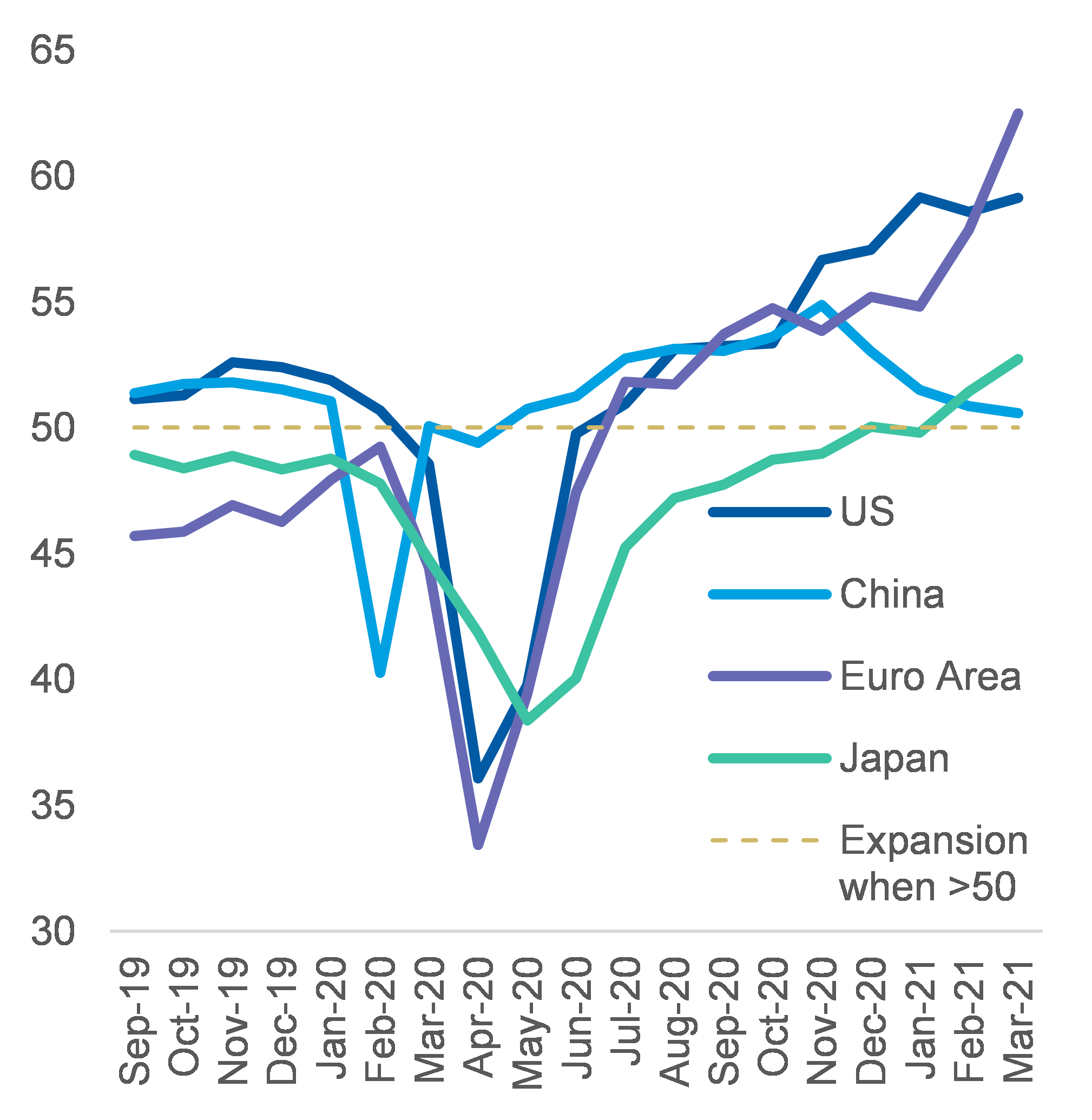
Source: Haver, Morgan Stanley Wealth Management Research. As of 23 April 2021. It is also notable that retail sales are surging in the US and China as social distancing measures are relaxed (see Exhibit 4). This shows that consumers have the confidence to spend the savings that were built up over the pandemic, another key element within our forecasts. Exhibit 4 – Retail Sales 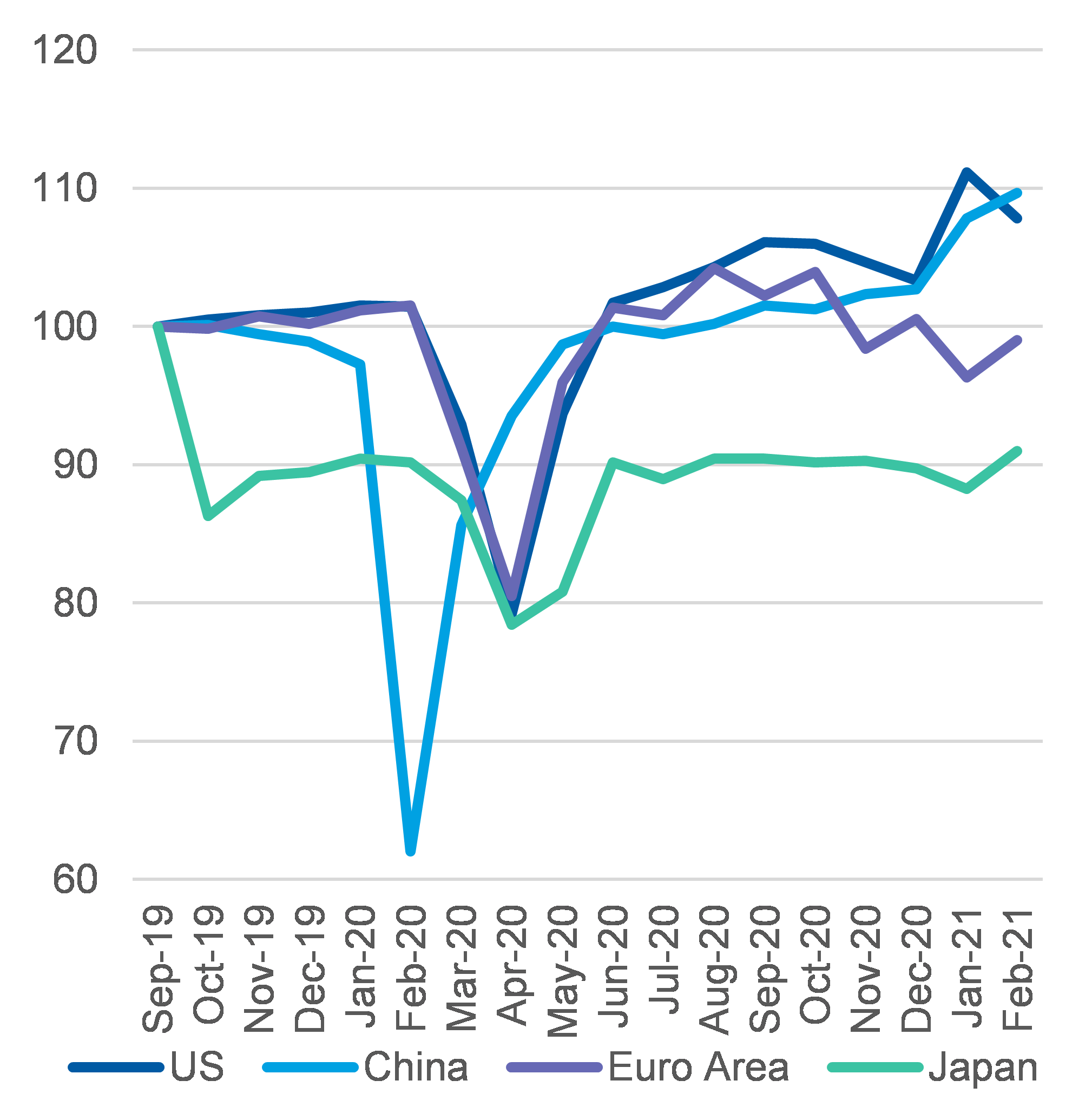
Source: Haver, Morgan Stanley Wealth Management Research. September 2019 = 100. As 23 April 2021. The services PMI (see Exhibit 5) shows the rest of the picture. Services make up around 60% of US consumer spending (versus 40% and 18% for Europe and China, respectively) and represent the portion of the economy (including restaurants and travel) most impacted by social distancing. Here the divergence on the journey to “max vax” is more mixed as the last final services PMI data in March for Europe was still below 50. However, in April, the preliminary data indicates that services surpassed the neutral 50 mark for the first time since last August.
It remains too early to
conclude that we are “off-track” from our “grand reopening” thesis. While just
looking at vaccination rates would suggest that the major economies (excluding
the US) are behind schedule, economic indicators are robust despite the current
prevalence rates of Covid-19 in the general population. Also, given that the
vaccine appears to reduce the potential severity of the virus, policymakers may
potentially relax their thresholds for social distancing, which would allow
more activity despite a limited vaccine rollout. Moving forward, we are closely
monitoring vaccination rates, services PMIs and retail sales with keen
interest. Exhibit 5 – Services PMI 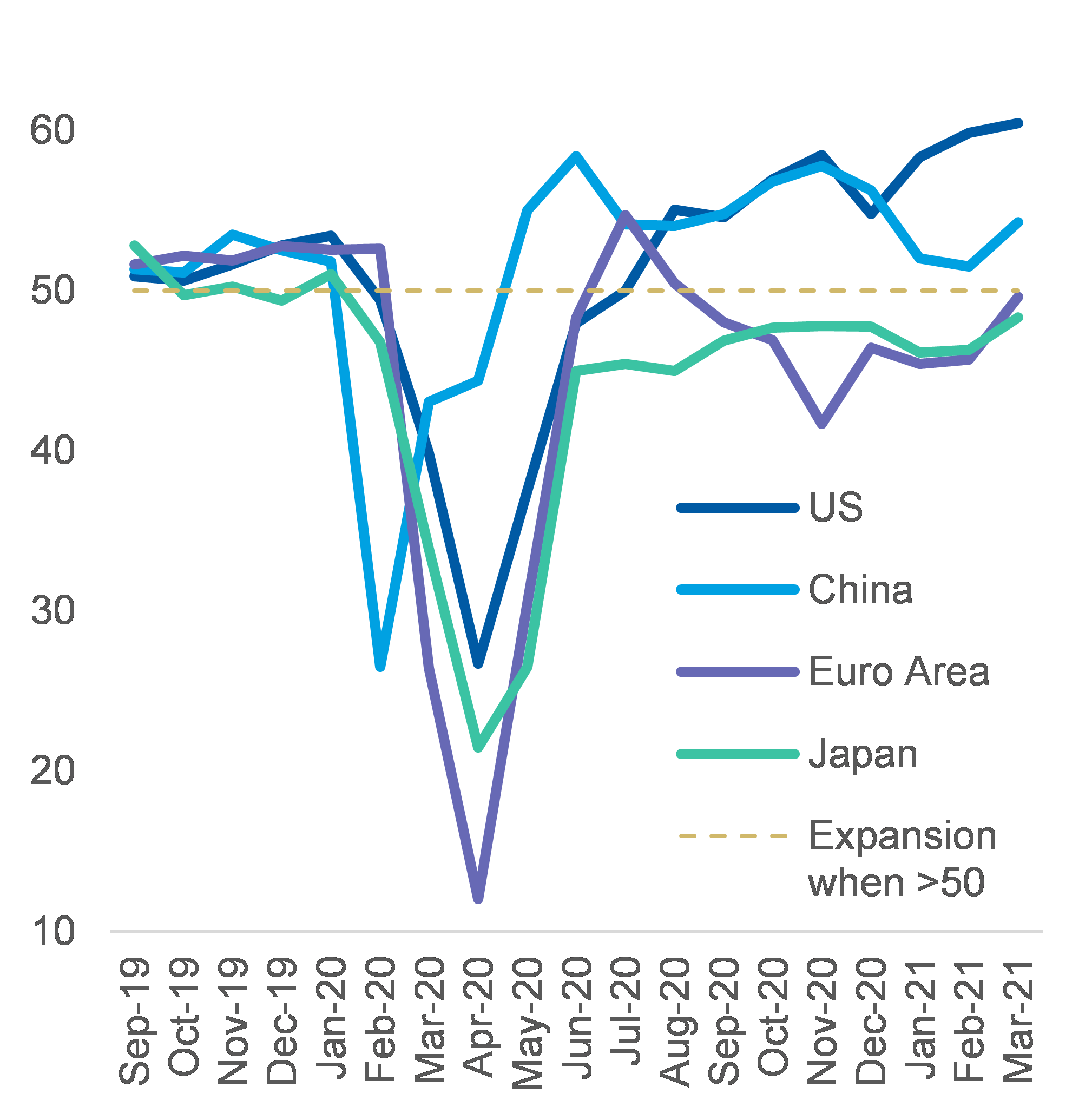
Source: Haver, Morgan Stanley Wealth Management Research. As of 23 April 2021. PositioningCurrently, we maintain our pro-risk asset allocation stance within our portfolios with an overweight to Equities, favouring International Equities. We continue to prefer the Value factor as it should outperform at this point in the economic cycle. We also reiterate our preference for the Quality factor. Within Fixed Income, we continue to favour lower quality, short duration, corporate debt to enhance the yield in our portfolios. We believe default risk remains low, and the risk of reducing our allocation to high-quality government bonds is justifiable at this time. We prefer industrial metals over precious metals. Within our Alternatives allocation, we prefer Private Equity and non-directional fixed income strategies.
Following are implementation ideas taken from our current Focus List. Value Factor
Orbis Global Equity Fund (APIR: ETL0463AU) The Orbis Global Equity Fund uses a long-term, value-oriented investing approach by taking a contrarian view based on fundamental analysis. The Fund holds a portfolio of 50 to 100 large and mid-cap stocks with both Developed and Emerging Markets included. The structured research process and robust peer review system provide rigour in developing stock ideas without lessening individual accountability. In our view, this has contributed to the positive performance of the strategy. Quality FactorVanEck Vectors MSCI World ex Australia Quality ETF (ASX: QUAL) The VanEck Vectors MSCI World ex Australia Quality ETF is designed to track the performance of the MSCI World ex Australia Quality Index (with net dividends reinvested) in Australian dollars, before taking into account fees, expenses and tax. The ETF holds a portfolio of ~300 international equities displaying three quality fundamentals: 1) high return on equity; 2) stable year-on-year earnings growth; and 3) low financial leverage. The index includes exposure to a diversified portfolio of quality global equities. Equity exposure is focused in the United States. This is our preferred ETF in the Global Equity Large Cap category due to robust measures of ‘quality', a large number of diversified holdings, narrower bid/ask spreads and a solid track record of performance. Absolute Return Fixed Income ExposureFranklin Australian Absolute Return Bond Fund (APIR: FRT0028AU) The Franklin Australian Absolute Return Bond I Class Fund invests in fixed income securities (government bonds, corporate credit and asset-backed securities) as well as fixed income derivatives and foreign currencies. The Fund employs an absolute return style of investing and aims to generate returns from a variety of sources including credit and macro factors. Overall, this is our preferred fund in the Fixed Income Miscellaneous category due to its strong heritage in fixed income investing, the Fund’s well-structured and consistent philosophy as well as its outperformance relative to peers.
Specialist advice from Morgan StanleyMorgan Stanley Australia focuses on providing individuals and institutions with specialist strategic advice and then helping implement these strategies through superior investment execution. For more of my insights, follow me here. Please speak to your Morgan Stanley financial adviser for a complete list of our other preferred active and passive instruments in each asset class as well as recommended baskets of direct shares reflecting the above investment themes. |
3 topics
1 contributor mentioned

